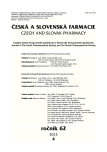-
Medical journals
- Career
Antioxidant activity of extracts and HPLC analysis of flavonoids from Capella bursa-pastoris (L.) Medik
Authors: Renata Kubínová; Věra Špačková; Emil Švajdlenka; Katarina Lučivjanská
Authors‘ workplace: Veterinární a farmaceutická univerzita, Farmaceutická fakulta, Ústav přírodních léčiv, Brno
Published in: Čes. slov. Farm., 2013; 62, 174-176
Category: Original Articles
Overview
The flavonoid profile of Capsella bursa-pastoris (L.) Medik. (Brassicaceae) and the antioxidant activity of its methanolic and aqueous extracts were studied. Glycosides of quercetin, chrysoeriol, kaempferol, and isorhamnetin were identified. Chrysoeriol O-glucoside and isorhamnetin O-rutinoside were detected in this species for the first time. The extracts presented an antioxidant activity against DPPH radicals, peroxyl radicals, hydroxyl radicals, and hydrogen peroxide.
Keywords:
Capsella bursa-pastoris • flavonoids • antioxidant activity
Sources
1. Grosso C., Vinholes J., Silva L. R., de Pinho P. G., Gonçalves R. F., Valentão P., Jäger A. K., Andrade P. B. Chemical composition and biological screening of Capsellabursa-pastoris. Rev. Bras. Farmacogn. 2011; 21, 635–644.
2. Kweon M. H., Kwak J. H., Ra K. S., Sung H. Ch., Yang H. Ch. Structural characterization of a flavonoid compounds cavenging superoxide anion radica lisolated from Capsellabursa-pastoris. J. Biochem. Mol. Biol. 1996; 29, 423–428.
3. Griffithsa D. W., Deightona N., Bircha A. N. E., Patrianb B., Baurb R., Städler E. Identification of glucosinolates on theleafsurface of plants from the Cruciferae and other closely related species. Phytochemistry 2001; 57, 693–700.
4. Jugea N., Mithena R. F., Trakaa M. Molecular basis for chemoprevention by sulforaphane: a comprehensive review. Cell. Mol. Life Sci. 2007; 64, 1105–1127.
5. Glawischnig E. Camalexin. Phytochemistry 2007; 68, 401–406.
6. Onyilagha J., Bala A., Hallett R., Gruber M., Soroka J., Westcott N. Leaf flavonoids of the cruciferous species, Camelina sativa, Crambespp., Thlaspiarvense and several other genera of the family Brassicaceae. Biochem. Syst. Ecol. 2003; 31, 1309–1322.
7. Blois M. S. Antioxidant determinativ by the use of a stable free radical. Nature 1958; 181, 1199–1200.
8. Ritov B. R., Goldma R., Stoyanovsky A. D., Menshikova E. V., Kagan E. V. Antioxidant paradoxes of phenolic compounds: peroxyl radiál scavenger nad lipid antioxidant, etoposide (VP-16), inhibits sarcoplasmatic reticulum Ca2+ -ATPase via thiol oxidation by its phenoxyl radical. Arch. Biochem. Biophys. 1995; 321, 140–152.
9. Parejo I., Petrakis C. H., Kefalas P. J. A transition metal enhanced luminal chemiluminescence in the presence of a chelator. Pharmacol. Toxicol. Method 2000; 43, 183–190.
10. Guo S., Deng Q., Xiao J., Xie B., Sun Z. Evaluation of antioxidant aktivity and preventing DNA damage effect of pomegranate extracts by chemiluminiscence method. J. Agric. Food. Chem. 2007; 55, 3134–3140.
11. Cao G., Sofic E., Prior R. L. Antioxidant and prooxi dant behavior of flavonoids: structure-activity relationships. Free Radic. Biol. Med. 1997; 22, 749–760.
Labels
Pharmacy Clinical pharmacology
Article was published inCzech and Slovak Pharmacy

2013 Issue 4-
All articles in this issue
- Development of financial participation of patients in the costs of pharmacotherapy in the years 2008–2012
- Effect of abiotic elicitation on the sanguinarine production and polyphenol oxidase activity in the suspension culture of Eschscholtzia californica CHAM.
- Antioxidant activity of extracts and HPLC analysis of flavonoids from Capella bursa-pastoris (L.) Medik
- Content uniformity of warfarin-containing mixtures and tablets
- Drugs of a Baroque monastery pharmacy
- Rare diseases in Italy: analysis of the costs and pharmacotherapy
- Czech and Slovak Pharmacy
- Journal archive
- Current issue
- Online only
- About the journal
Most read in this issue- Drugs of a Baroque monastery pharmacy
- Content uniformity of warfarin-containing mixtures and tablets
- Antioxidant activity of extracts and HPLC analysis of flavonoids from Capella bursa-pastoris (L.) Medik
- Effect of abiotic elicitation on the sanguinarine production and polyphenol oxidase activity in the suspension culture of Eschscholtzia californica CHAM.
Login#ADS_BOTTOM_SCRIPTS#Forgotten passwordEnter the email address that you registered with. We will send you instructions on how to set a new password.
- Career

